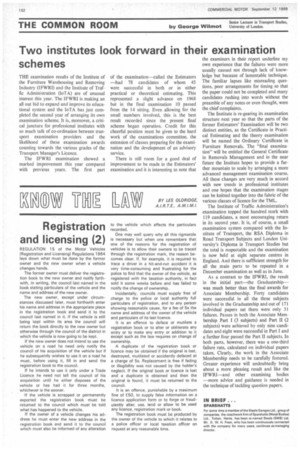Registration and licensing (2)
Page 154

If you've noticed an error in this article please click here to report it so we can fix it.
REGULATION 15 of the Motor Vehicles (Registration and Licensing) Regulations 1964 lays down what must be done by the former owner and the new owner when a vehicle changes hands.
The former owner must deliver the registration book to the new owner and notify forthwith, in writing, the council last named in the book stating particulars of the vehicle and the name and address of the new owner.
The new owner, except under circumstances discussed later, must forthwith enter his name and address in the appropriate place in the registration book and send it to the council last named in it. If the vehicle is still being kept within its area the council will return the book directly to the new owner but otherwise through the council of the district in which the vehicle is now going to be kept.
If the new owner does not intend to use the vehicle on a road he need only notify the council of his acquisition of the vehicle but if he subsequently wishes to use it on a road he must, before using it, fill in and send the registration book to the council.
If he intends to use it only under a Trade Licence he need not tell the council of his acquisition until he either disposes of the vehicle or has had it for three months, whichever is the sooner.
If the vehicle is scrapped or permanently exported the registration book must be returned to the council which must be told what has happened to the vehicle.
If the owner of a vehicle changes his address he must enter the new address in the registration book and send it to the council which must also be informed of any alteration to the vehicle which affects the particulars recorded.
One may well query why all this rigmarole is necessary but when one remembers that one of the reasons for the registration of vehicles is to allow their owners to be traced through the registration mark, the reason becomes clear. If, for example, it is required to trace a driver in a hit-and-run accident it is very time-consuming and frustrating for the police to find that the owner of the vehicle, as registered with the taxation authority, in fact sold it some weeks before and has failed to notify the change of ownership.
Incidentally, councils must supply free of charge to the police or local authority full particulars of registration, and to any person showing reasonable cause, for a fee of 5s the name and address of the owner of the vehicle and particulars of its last licence.
It is an offence to deface or mutilate a registration book or to alter or obliterate any entry or to make any entry or addition to it except such as the law requires on change of ownership.
A duplicate of the registration book or licence may be obtained if the original is lost, destroyed, mutilated or accidently defaced at a charge of 5s. Replacement is free if fading or illegibility was not caused by the holder's neglect. If the original book or licence is lost and a duplicate is obtained and then the original is found, it must be returned to the council.
It is an offence, punishable by a maximum fine of £50. to supply false information on a licence application form or to forge or fraudulently alter, use, lend or allow to be used any licence, registration mark or book.
The registration book must be produced by the owner of the vehicle to which it relates to a police officer or local taxation officer on request at any reasonable time.




































































































































































































